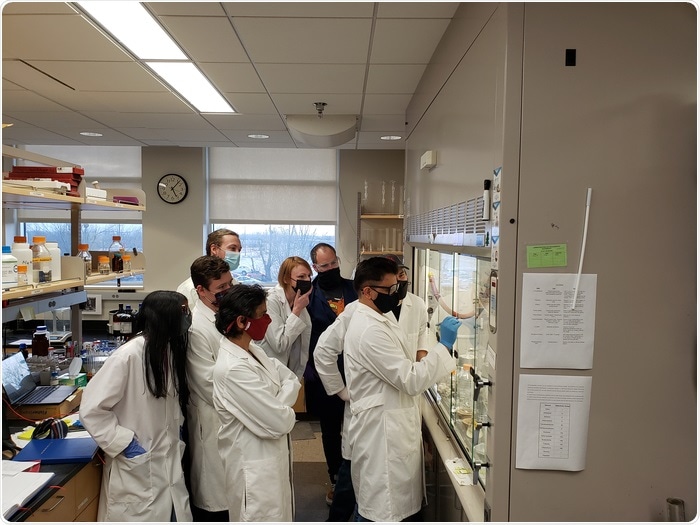Although several people think of medicines as purely synthetic compounds, nature is an important element of most of the medications humans depend on. The difficulty in operating with these compounds arises out of the need to extract them in economically viable and environmentally flexible ways to meet pharmaceutical requirements.

Singh Group at the University of Oklahoma. Image Credit: University of Oklahoma.
Shanteri Singh, an assistant professor in the Department of Chemistry and Biochemistry, Dodge Family College of Arts and Sciences at the University of Oklahoma, headed research that is taking a novel approach to addressing these complex problems. Her method avoids expanding whole plants and animals by co-opting their enzymes—the biological machinery that performs chemical changes—for immediate compound synthesizing.
What nature is already doing in plants, animals, and microorganisms, we want to recreate in the lab. We’re using enzymes, nature’s chemists, added together in a sustainable host like E. coli to try to synthesize it, because growing plants take years.”
Shanteri Singh, Assistant Professor, Department of Chemistry and Biochemistry, Dodge Family College of Arts and Sciences, University of Oklahoma
Singh is also a member of the Institute for Natural Products Applications and Research Technologies as well as a member of the Oklahoma Center of Biomedical Research Excellence in Structural Biology.
In comparison to the months necessary to grow, yield, and extract compounds from plants, E. coli, a common host for microbiological testing, multiply rapidly. Each cell reproduces itself in less than 20 minutes.
If we put the enzymes in E. coli, we can get huge amounts of them within a day; it’s exponential growth. Then we purify them and use them to perform reactions that convert simple starting materials into valuable compounds.”
Shanteri Singh, Assistant Professor, Department of Chemistry and Biochemistry, Dodge Family College of Arts and Sciences, University of Oklahoma
Singh has been using this novel method to synthesize isoprenoids, a significant group of organic products separated from plants and microorganisms, and is supported by a $1.4 million, five-year R01 grant from the National Institutes of Health.
Most of the drugs we have today originated from natural products. If a natural product comes from a plant, you would have to cut down a lot of plants in order to isolate a small amount of it. But these natural products and other potential drug compounds are biosynthesized by a set of enzymes which we can generate outside of the plant for our own uses.”
Shanteri Singh, Assistant Professor, Department of Chemistry and Biochemistry, Dodge Family College of Arts and Sciences, University of Oklahoma
“What my lab does is study these enzymes to understand how they behave. We engineer these enzymes to make natural as well as non-natural compounds which can be used as potential drug molecules,” she added.
Singh’s lab is working on a multi-enzyme platform capable of producing a wide range of molecules for this research work. They are working on the development of two key compound classes: squalenes and cannabinoids.
Cannabinoids
Cannabinoids are molecules that are made by the plant Cannabis sativa, the most well-known of which are CBD and THC. THC is the psychoactive constituent of marijuana, whereas CBD is not.
“The combination of THC and CBD gives rise to several different drugs that have implications in a number of neurodegenerative diseases. People are investigating their potential roles in treating Alzheimer’s disease, Parkinson’s disease, and epilepsy,” says Singh.
The study mentioned by Singh reached a significant breakthrough in 2018 when the FDA approved Epidiolex, a CBD-based drug, to control seizures incurred by a rare, serious form of epilepsy.
“Normally, Cannabis sativa produces a tiny amount of the necessary compounds, so we wanted to know how we can sustainably produce large quantities of the cannabinoids. Using our platform, we are hoping to produce a good amount of not only the natural cannabinoids but novel cannabinoid analogs, which can be tested as potential drug compounds,” Singh added.
Squalene
Singh’s research group is also looking into squalene, a compound discovered in some fish oils and most frequently derived from shark livers. Squalene is used as an adjuvant in many influenza vaccines, and it is broadly used in combination with these vaccines to boost the immune reaction and enhance protection against infections.
Singh says, “it’s been seen that using squalene as a vaccine adjuvant has very good advantages. It has good immunological properties, generating large amounts of antibodies and a good immune response. Even now, there are studies investigating using squalene as an adjuvant in COVID-19 vaccines, which would require a lot of squalene and would require killing even more sharks.”
“Furthermore, the squalene obtained from sharks can contain a lot of environmental contaminants because the oceans have a lot of pollutants. Purifying those contaminants from squalene is not easy,” she added.
Singh’s investigation offers great promise of providing opportunities for synthesizing large amounts of these beneficial compounds in a viable and cost-effective way.
Ann West, an associate vice president for research development at the University of Oklahoma, appreciates the research project stating, “Dr. Singh’s platform is a clever engineered approach to making better drugs, and the potential environmental and health benefits are significant.”